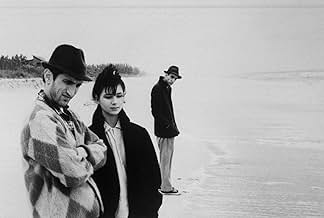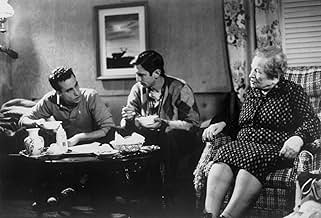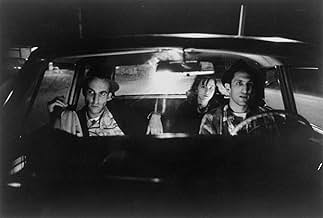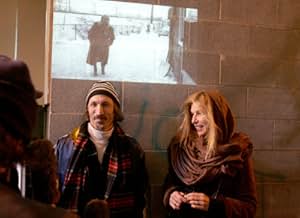PUNTUACIÓN EN IMDb
7,4/10
42 mil
TU PUNTUACIÓN
La vida de un neoyorquino es sacudida por la inesperada visita de su primo, que les lleva a una aventura impredecible.La vida de un neoyorquino es sacudida por la inesperada visita de su primo, que les lleva a una aventura impredecible.La vida de un neoyorquino es sacudida por la inesperada visita de su primo, que les lleva a una aventura impredecible.
- Dirección
- Guión
- Reparto principal
- Premios
- 8 premios y 2 nominaciones en total
Reseñas destacadas
Watched for the second time the other night, and was struck how formal this really is. Every scene is a single take, some static, some with very stylized camera movement (static shot up the street to an approaching car; pick up car and track it as it passes, static again as it drives off). Occasionally an actor wanders off screen to the right, despite the camera trying to keep up; just this slight effect, surrounded as it is by so much silence and stillness, is enough to produce a slight frisson of tension. Blackouts separate the scenes, but either ambient sound or music cues continue as transitions during the cuts.
The main characters' costumes underline their alienation from the world around them. Judging from the props & surroundings, film seems to be set in contemporary (early-1980s) time. Willie and Eddie dress and act like late-Fifties/early-Sixties racetrack touts, and they seem most at ease in the retro living room of Aunt Lotte, who presumably left Hungary during that period. Eva's costumes likewise proclaim 'outsider,' though the dreary black she wears can signify either a refugee from East Europe or a jaded bohemian poseur.
First viewing a number of years back, I thought the film was offhanded and casual, with not much going on. A second viewing changed my mind - the absolute minimalism of the plot and dialogue leave plenty of space to explore Jarmusch's technique, composition, etc. It made me laugh out loud a couple of times, too.
The main characters' costumes underline their alienation from the world around them. Judging from the props & surroundings, film seems to be set in contemporary (early-1980s) time. Willie and Eddie dress and act like late-Fifties/early-Sixties racetrack touts, and they seem most at ease in the retro living room of Aunt Lotte, who presumably left Hungary during that period. Eva's costumes likewise proclaim 'outsider,' though the dreary black she wears can signify either a refugee from East Europe or a jaded bohemian poseur.
First viewing a number of years back, I thought the film was offhanded and casual, with not much going on. A second viewing changed my mind - the absolute minimalism of the plot and dialogue leave plenty of space to explore Jarmusch's technique, composition, etc. It made me laugh out loud a couple of times, too.
Odd and inspiring. This film rings true with rich detail in its depictions of utter loneliness. Smoking many Chesterfields, watching television, playing solitaire, visiting Aunt Lottie, sightseeing at Lake Erie (for God's sake). It alters from tragic to comic from almost moment to moment, and often has a foot in both pools.
Jarmusch is minimalist to the core with this one, and yet manages to pull off a solid story. A small black and white gem that deserves a larger audience.
Jarmusch is minimalist to the core with this one, and yet manages to pull off a solid story. A small black and white gem that deserves a larger audience.
Reading over the comments so far, it seems that most people think this film is great, with a rare few criticizing it for being a boring 'student-film'.
People, this is for sure not a film for those who've been brutalized by too much Hollywood cinema - it's a quiet movie that you absorb slowly. It's very well done and quite absorbing. Sure it makes me think of so-called student-films (my brother is in film school), but that's not to say it's not a damn good one. There's something to be said for beautiful photography (the black and white images go so well with the feelings of emptiness and coldness) and the search for a meaning in life. These people are desperately in need of meaning and affection, none of which they seem to be able to find - or give. This is a movie about that desperate search.
And it's well worth seeing - for those with a bit of patience and artistic sensibility. It's a movie about emptiness for sure, but is by no means 'boring'. I'd give it 4/5 stars.
People, this is for sure not a film for those who've been brutalized by too much Hollywood cinema - it's a quiet movie that you absorb slowly. It's very well done and quite absorbing. Sure it makes me think of so-called student-films (my brother is in film school), but that's not to say it's not a damn good one. There's something to be said for beautiful photography (the black and white images go so well with the feelings of emptiness and coldness) and the search for a meaning in life. These people are desperately in need of meaning and affection, none of which they seem to be able to find - or give. This is a movie about that desperate search.
And it's well worth seeing - for those with a bit of patience and artistic sensibility. It's a movie about emptiness for sure, but is by no means 'boring'. I'd give it 4/5 stars.
Jarmusch was never much of a guy to dip in the mainstream; "Ghost Dog: Way of the Samurai" is about as Hollywood as you're going to get from him. His recent "Coffee and Cigarettes" might have alluded to his roots as an indie filmmaker, but its stories are monochromatic and offer little emotional variety save for the Albert Molina vignette. His best film might be this one, a miniature masterpiece that is underrated when compared to his other stuff. The basic premise of the film revolves around a New York immigrant from Eastern Europe, his goofy buddy, and his female cousin who comes to visit him and America as they jump from state to state.
There isn't much of a plot for sure, but Jarmusch more than compensates for this fact by creating three distinct characters that manage to be sweet without resorting to cheap sentiment. These guys might be rude and frivolous at times, but they never lose their sense of embarrassed compassion, nor as a direct result their humanity as complete characters as well. There's a morose wit to all of these proceedings. All three actors truly seem to have a playful camaraderie, working the motions of a natural friendship with Jarmusch's direction that shows them at their happiest only to be disappointed again and again, like a kid getting clothes instead of video games at Christmas once more. This honest and easygoing subtext doesn't include undemanding Hollywood moments of syrupy tenderness or mawkish emotion. For once, the clichéd adage of characters writing themselves is probably true here, as the film has an almost improvised quality to it. Jarmusch gets the careful balance between static ugliness and a subtext of natural warmth just right.
While the great heart of this film lies in its characterization, it's catapulted into greatness because of Jarmusch's quiet touch. In nearly every one of his films the director is obsessed with the awkward silences that make up nearly every relationship. He's much more revealing with the silences here, fleshing out character development in a car ride or while staring out at the blankness of snowy Cleveland. This brings me to my final point that Jarmusch again does with intelligence. When the characters move from city to city, they have a passionate belief that what they will find is something unbelievable. But the New York we see is a bunch of back alleys and graffiti. Cleveland is a blank white expanse, strangely vapid as opposed to pictorial. And Florida has to be the ugliest Florida ever depicted on screen, consisting mainly of a "Welcome to Florida" sign and a decrepit motel. While the main message is that life is often full of disappointments, that life is rarely full of transcendent moments, people can still connect with each other regardless of their surrounding environments. It's Jarmusch's best statement yet, and it's for these reasons this one must be seen even before even his fine "Mystery Train." The film, essentially a three-character comedy, is also thankfully kept brief, becoming genuinely meaningful and moving as a result.
There isn't much of a plot for sure, but Jarmusch more than compensates for this fact by creating three distinct characters that manage to be sweet without resorting to cheap sentiment. These guys might be rude and frivolous at times, but they never lose their sense of embarrassed compassion, nor as a direct result their humanity as complete characters as well. There's a morose wit to all of these proceedings. All three actors truly seem to have a playful camaraderie, working the motions of a natural friendship with Jarmusch's direction that shows them at their happiest only to be disappointed again and again, like a kid getting clothes instead of video games at Christmas once more. This honest and easygoing subtext doesn't include undemanding Hollywood moments of syrupy tenderness or mawkish emotion. For once, the clichéd adage of characters writing themselves is probably true here, as the film has an almost improvised quality to it. Jarmusch gets the careful balance between static ugliness and a subtext of natural warmth just right.
While the great heart of this film lies in its characterization, it's catapulted into greatness because of Jarmusch's quiet touch. In nearly every one of his films the director is obsessed with the awkward silences that make up nearly every relationship. He's much more revealing with the silences here, fleshing out character development in a car ride or while staring out at the blankness of snowy Cleveland. This brings me to my final point that Jarmusch again does with intelligence. When the characters move from city to city, they have a passionate belief that what they will find is something unbelievable. But the New York we see is a bunch of back alleys and graffiti. Cleveland is a blank white expanse, strangely vapid as opposed to pictorial. And Florida has to be the ugliest Florida ever depicted on screen, consisting mainly of a "Welcome to Florida" sign and a decrepit motel. While the main message is that life is often full of disappointments, that life is rarely full of transcendent moments, people can still connect with each other regardless of their surrounding environments. It's Jarmusch's best statement yet, and it's for these reasons this one must be seen even before even his fine "Mystery Train." The film, essentially a three-character comedy, is also thankfully kept brief, becoming genuinely meaningful and moving as a result.
10romper-2
I just finished watching Stranger Than Paradise on DVD - the first time I'd seen it since its year of release. I'd always recalled the film with fondness, although I could never remember why I liked it. Several years after seeing the movie I came across the John Lurie soundtrack and bought it without stopping to listen, and been slightly taken aback by it. The haunting pieces were more emotionally esoteric than I expected, and it took some time for the album to grow on me.
Seeing the movie again, I understand why. The only piece of popular music in the film is Screamin' Jay Hawkin's "I Put a Spell on You" and, although I had forgotten that it was there, I guess that I had expected the soundtrack to be more like those of mainstream movies and have songs and such-like. I think that Lurie's music is perfect in situ and, as I've said, the soundtrack has also grown on me as standalone pieces.
The movie itself is a masterpiece. The black and white images present a starkness and a clarity that heightens the alienation of self in a land that was supposed to be the new hope for immigrants from a decaying old world. Instead we see Eva walking through a deserted ghost world of New York where the graffiti says "Yankee go home". America is only a dream, a collective vision of a better world; paradise somewhere on earth.
As Willie and Eddie journey west after winning some money, we see that the supposedly beautiful city of Cleveland is cold and desolate with a frozen lake. The further trip to Florida ends in the middle of nowhere next to a bleak and windswept ocean. Paradise is still somewhere out of reach. I think that's why the movie appeals to me. It shows that the America of popular mythology - the home of the brave, land of the free, protector of the downtrodden, guardian of democracy in the free world - is merely a construct. Too many people these days believe in the child's fantasy of America being some paradise that Iraq and Afghanistan should emulate. Jarmusch reminds us that it is people who give meaning to a symbol, not the other way around. He allows for the ability of people to make their own meanings and evolve beyond the stagnation of popular culture.
At a time I originally saw this movie I had recently left home and got my first job, moving from the country to the city, and maybe to some extent I identified with Eva - moving from Budapest to America. It was also my first taste of grownup film, if I recall correctly, and confirmed me with a lifelong fascination with the cinema. I have a lot to thank Jim Jarmusch for.
Seeing the movie again, I understand why. The only piece of popular music in the film is Screamin' Jay Hawkin's "I Put a Spell on You" and, although I had forgotten that it was there, I guess that I had expected the soundtrack to be more like those of mainstream movies and have songs and such-like. I think that Lurie's music is perfect in situ and, as I've said, the soundtrack has also grown on me as standalone pieces.
The movie itself is a masterpiece. The black and white images present a starkness and a clarity that heightens the alienation of self in a land that was supposed to be the new hope for immigrants from a decaying old world. Instead we see Eva walking through a deserted ghost world of New York where the graffiti says "Yankee go home". America is only a dream, a collective vision of a better world; paradise somewhere on earth.
As Willie and Eddie journey west after winning some money, we see that the supposedly beautiful city of Cleveland is cold and desolate with a frozen lake. The further trip to Florida ends in the middle of nowhere next to a bleak and windswept ocean. Paradise is still somewhere out of reach. I think that's why the movie appeals to me. It shows that the America of popular mythology - the home of the brave, land of the free, protector of the downtrodden, guardian of democracy in the free world - is merely a construct. Too many people these days believe in the child's fantasy of America being some paradise that Iraq and Afghanistan should emulate. Jarmusch reminds us that it is people who give meaning to a symbol, not the other way around. He allows for the ability of people to make their own meanings and evolve beyond the stagnation of popular culture.
At a time I originally saw this movie I had recently left home and got my first job, moving from the country to the city, and maybe to some extent I identified with Eva - moving from Budapest to America. It was also my first taste of grownup film, if I recall correctly, and confirmed me with a lifelong fascination with the cinema. I have a lot to thank Jim Jarmusch for.
¿Sabías que...?
- CuriosidadesDirector Jim Jarmusch was dismayed to discover all the money he paid for the rights to Screamin' Jay Hawkins' "I Put a Spell on You" went to the record company, with nothing going to Hawkins himself. When the film earned a profit, Jarmusch took it upon himself to track down Hawkins (who was living in a trailer park, at the time) and give him some money. It was the beginning of a friendship that lasted until Hawkins' death. According to Jarmusch, Hawkins continuously swore he'd pay him back, despite Jarmusch's insistence that the money was a gift.
- PifiasWhen Eddie and Willie are driving to Cleveland, the camera and camera operator can be seen in the reflection of the rear view mirror.
- ConexionesEdited from Stranger than Paradise (1983)
- Banda sonoraI Put a Spell on You
Written by Screamin' Jay Hawkins (as Jay Hawkins)
Used by permission of CBS Unart Catalog, Inc.
All Rights Reserved.
Performed by Screamin' Jay Hawkins
Courtesy of CBS Records
Selecciones populares
Inicia sesión para calificar y añadir a tu lista para recibir recomendaciones personalizadas
- How long is Stranger Than Paradise?Con tecnología de Alexa
Detalles
- Fecha de lanzamiento
- Países de origen
- Idiomas
- Títulos en diferentes países
- Stranger Than Paradise
- Localizaciones del rodaje
- 464 Newark St, Hoboken, Nueva Jersey, EE.UU.(Corner building when Eva first arrives and walks to apartment)
- Empresas productoras
- Ver más compañías en los créditos en IMDbPro
Taquilla
- Presupuesto
- 90.000 US$ (estimación)
- Recaudación en Estados Unidos y Canadá
- 2.436.000 US$
- Recaudación en todo el mundo
- 2.454.393 US$
- Duración
- 1h 29min(89 min)
- Color
- Relación de aspecto
- 1.85 : 1
Contribuir a esta página
Sugerir un cambio o añadir el contenido que falta





























